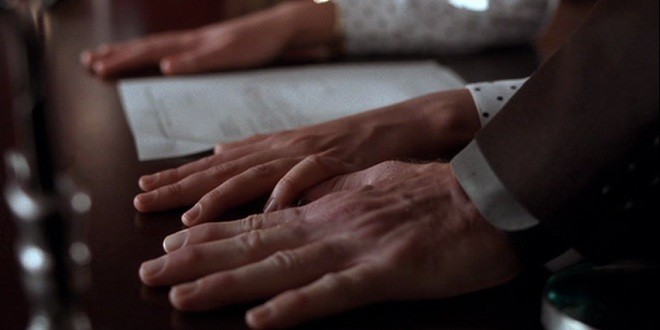Spoiler Scale (How spoilery is this article on a scale of 1 to 10?): 5
In recognition of the holiday, this article is the first installment of four published in February 2013 highlighting my favorite love stories put to celluloid in the 21st century.
Director Steven Shainberg has described his second feature film, Secretary, as a “black comedy coming-of-age” – at least on its surface. But what Shainberg was really going for was a movie akin to My Beautiful Laundrette (1985). Based on a short story by Mary Gaitskill (“Bad Behavior”), Shainberg and screenwriter, Erin Cressida Wilson, manage to convey a truly compelling love story by portraying a dominant and submissive (“D&S”) relationship with emotional honesty and without fetishizing, marginalizing, or demonizing.
The film begins with twenty-something Lee (Maggie Gyllenhaal) emerging from a psychiatric institution, where she felt comfortable with the structured routine. It is evident from the start that Lee cuts and burns herself as a coping mechanism, and as we find out later, one particular incident was perceived as a suicide attempt and resulted in her commitment. Living at home under the close eye of her mother (Lesley Anne Warren) and under the spectre of her alcoholic father (Stephen McHattie), Lee attends the local community college and scores particularly high marks for typing. As a result, she interviews for a secretarial position with lawyer J. Edward Grey (James Spader). It is clear that the average secretary does not last long at Edward’s firm.
And as is apparent from the interview, Edward has issues of his own (not the least of which is the need for a human resources consultant). But Lee takes to her very first job with both enthusiasm and awkwardness. As her life normalizes, her parents set her up with a high school friend, Peter (Jeremy Davies), who has his own psychological issues (nervous breakdown) but has a stable job.
Lee’s own realizations from her relationship with Edward is the real heart of the film. In this scene, having recently witnessed Lee cutting herself at her desk in a particularly stressful moment, Edward first crosses the line of the normal employer-employee relationship and begins to exercise the “D” part of the D&S.
For the vast majority of women, I imagine that this sort of conversation would be patently offensive. But Lee has psychological needs which would defy the understanding of most of us. Her gradual submission to Edward ultimately proves to be empowering to her, and Shainberg and company are able to show us a subtle balance between Edward and Lee that on its surface would seem contradictory. Ironically, it is Edward’s own self-doubt and insecurities that keep the relationship from evolving. And it is Lee who fantasizes about taking her relationship with Edward to a sexual level.
In stark contrast, sex in a “normal” romantic relationship with Peter is portrayed through Lee’s eyes as absurd.
To be sure, the last 15 minutes of the film is likely to provoke either an extremely positive or negative response depending on the disposition of the viewer. But when all is said and done, Secretary manages to convey, in a uniquely powerful way, two essential truths of any great love story – love occurs between two people and nobody else, and there is no room for shame between lovers.
Grade: A





